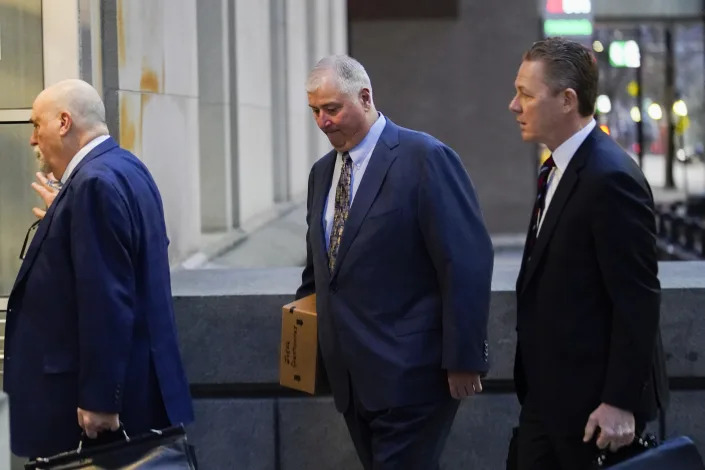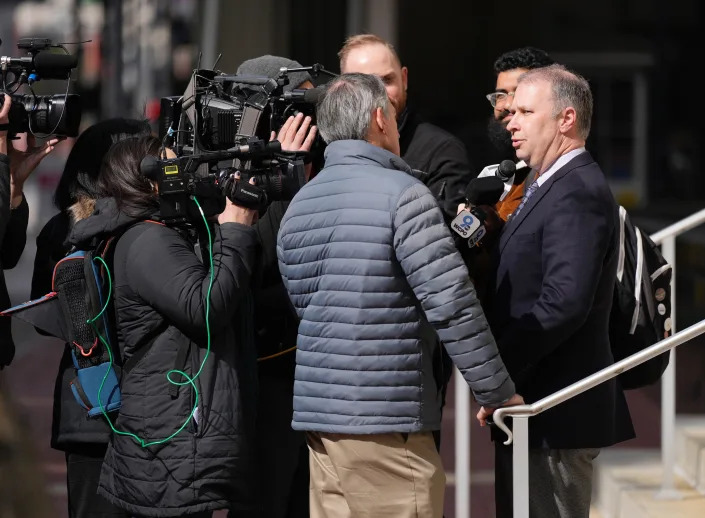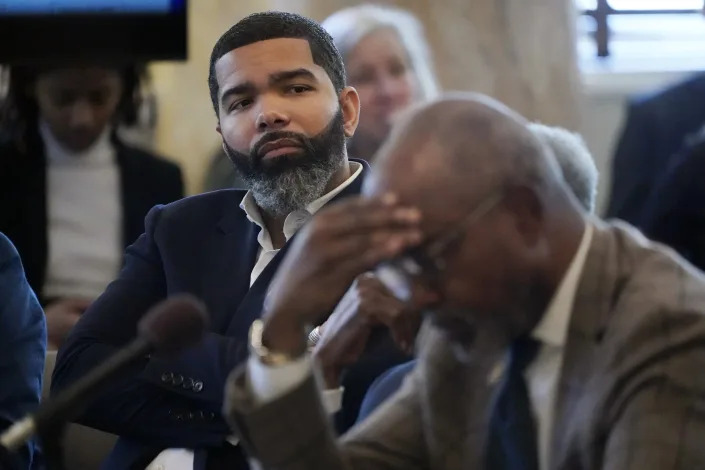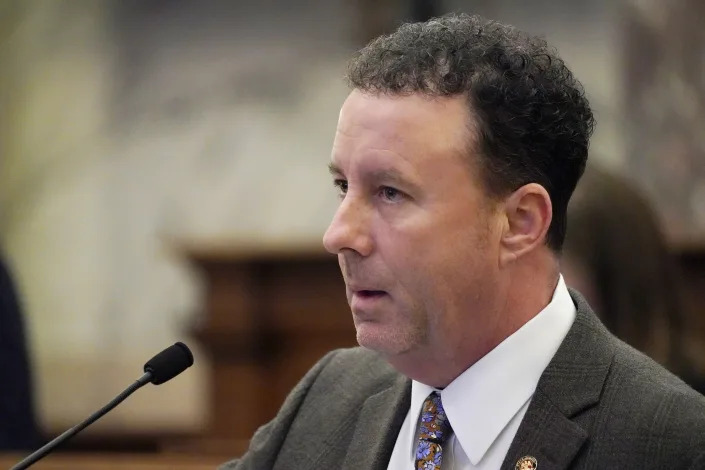


LEAH WILLINGHAM
Thu, March 9, 2023
MORGANTOWN, W.Va. (AP) — The tiny clinic where physicians prescribe hormones and other medications to transgender teenagers shares the same campus where West Virginia kids travel to receive treatments for rare cancer, heart surgery and other health care difficult to get anywhere else.
In a rural state purported to have the highest number of transgender youths per capita and some of the nation’s worst health outcomes, West Virginia University Medicine doctors say transgender health care is just as essential as the other lifesaving services they provide.
But it could soon be banned. Ignoring doctors' pleas, lawmakers are preparing to vote this week on a bill that would outlaw certain health care for transgender minors, including hormone therapy and fully reversible medication that suspends the physical changes of puberty, buying patients and parents time to make future decisions about hormones.
"There's a lot of anxiety and fear in our exam rooms right now," said Dr. Kacie Kidd, medical director of WVU Medicine Children's Adolescent Gender and Sexual Development Clinic.
State lawmakers and West Virginia's largest health care provider are at odds over how and when to treat adolescents with gender dysphoria — the severe psychological distress experienced by those whose gender identity differs from their sex assigned at birth.
WVU's classification among the highest level of American research universities is often lauded by the same state leaders who have been unwilling to listen to experts when it comes to gender-affirming care. During a meeting last week at which Kidd testified before lawmakers, Senate Finance chair Eric Tarr described the treatments as “child abuse."
“I was caught off guard to see that WVU Medicine has a clinic to change the sex of children in West Virginia," the Republican said, leading a charge to reject amendments that would have allowed some care to continue. Two physicians on the committee — both Republicans — expressed concern, saying “medically uneducated” people shouldn't be making such decisions.
Lawmakers in West Virginia and other states advancing similar legislation often characterize gender-affirming treatments as medically unproven, potentially dangerous in the long term and a symptom of “woke” culture.
Yet every major medical organization, including the American Medical Association, the American Academy of Pediatrics and the American Psychiatric Association, supports gender-affirming care for youths.
The legislation in West Virginia also includes a ban on gender-affirming surgery for minors, something medical professionals emphasize does not happen in the state.
Lia Farrell, a WVU medical student from New York, said it was clear to her that lawmakers have "no idea what providing this care actually entails."
"It’s really cutting off your nose to spite your face," she said. “This isn’t going to accomplish anything except harming people and preventing us from doing our jobs."
Opened in 2021, WVU Medicine Children's Adolescent Gender and Sexual Development Clinic looks like any other health care setting — animal-shaped stickers cover the walls, examination rooms, machines to check blood pressure and heart rates. But providers wear lanyards with colorful buttons displaying pronouns and jackets decorated with a rainbow heart and stethoscope — something Kidd calls “visible reminders" of support.
Some families travel for hours on mountain roads to meet with providers, including therapists. While they talk, young people draw to calm their nerves. Kidd has several patients' creations displayed in her workspace, including one favorite, a unicorn.
A West Virginia native, Kidd was training to be a pediatrician at WVU when she began meeting transgender kids hospitalized after suicide attempts.
Patients have described gender dysphoria to her as a profound, deeply rooted frustration — even sometimes anger — that the person in the mirror “isn’t who they are."
“I’ve had young people tell me that they can’t imagine a future where they can be happy,” she said. “That’s one of the most heartbreaking things I ever hear.”
Dakota Kai, 17, spent childhood in and out of psychiatric care because of depression and anxiety related to gender dysphoria.
Kai said the testosterone gel they apply to their shoulders, which has caused their voice to deepen and facial hair to sprout, has saved their life.
“It’s literally going to kill people if they can’t access this care,” Kai said. “It’s difficult to try to exist in a place where it’s threatening just being yourself.”
Kai is now planning to start college this year and eventually become a cardiovascular surgeon.
Kai's mother, Sherry, said she was apprehensive at first about hormone therapy. But after conversations with providers, she and her child confidently decided to pursue it and have no regrets. Transgender minors can't begin medical interventions without parental consent.
“The amount of ignorance about the subject is honestly astounding,” she said. “Watching our society respond with such emotional fervor about something that they obviously logically don’t understand is terrifying.”
She said nothing about the care is pushed on patients, “lightly talked about or treated as if it’s no big deal."
“They are not trying to play God,” Sherry said. “They’re out there trying to perform a service of helping people, and because of science and because of time and because of studying the concept of being trans are able to say, ‘This is not fictitious or just a whim. This is a scientific, medical fact.’”
As the ban advances through the Legislature, Kidd's staff works late in the clinic, leaving long after dark to fit in appointments with frantic families.
“It is heartbreaking,” Kidd said, “to have to tell young people and families that we can’t provide the care that they need.”
This week, providers saw a 12-year-old patient, a transgender girl whose relatives said they'd known her identity since she was 3. She expressed distress about her voice deepening or growing hair on her underarms and face — concern about her body betraying her, of not being seen for who she is.
They talked through options, which included puberty-blocking medication lawmakers seek to ban — a fully reversible pause on puberty that provides significant relief for dysphoria.
Another was a 16-year-old patient who was hospitalized for the most recent time last year. When he came in, he couldn't speak at all. His parents were terrified.
But on this visit, he chattered happily about a new pet and a video game he couldn’t put down.
“It's such a joy, a year later for this particular patient, for this conversation to be profoundly different,” Kidd said.
Other children talked with therapists about anxiety over a school dance or asked for help on plans to talk to relatives about their gender identity. No medical interventions are provided to patients before the age of puberty.
El Didden, a WVU medical student who worked in the clinic as a researcher, said the providers are role models for “going above and beyond and acting like it’s the bare minimum.”
Didden, who is transgender, started hormone therapy the summer before starting medical school, when only a Planned Parenthood clinic was offering the service in the state. It inspires Didden as a future physician to see compassionate health care for people “who don't normally get that level of respect and care.”
Kidd's catchphrase for the clinic is "happy, healthy, thriving.” Didden wishes lawmakers understood.
“They think that in the choice between having a trans kid and having a dead kid, they prefer to have a dead kid,” Didden said, something that is “just existentially horrifying to think about.
Thu, March 9, 2023
MORGANTOWN, W.Va. (AP) — The tiny clinic where physicians prescribe hormones and other medications to transgender teenagers shares the same campus where West Virginia kids travel to receive treatments for rare cancer, heart surgery and other health care difficult to get anywhere else.
In a rural state purported to have the highest number of transgender youths per capita and some of the nation’s worst health outcomes, West Virginia University Medicine doctors say transgender health care is just as essential as the other lifesaving services they provide.
But it could soon be banned. Ignoring doctors' pleas, lawmakers are preparing to vote this week on a bill that would outlaw certain health care for transgender minors, including hormone therapy and fully reversible medication that suspends the physical changes of puberty, buying patients and parents time to make future decisions about hormones.
"There's a lot of anxiety and fear in our exam rooms right now," said Dr. Kacie Kidd, medical director of WVU Medicine Children's Adolescent Gender and Sexual Development Clinic.
State lawmakers and West Virginia's largest health care provider are at odds over how and when to treat adolescents with gender dysphoria — the severe psychological distress experienced by those whose gender identity differs from their sex assigned at birth.
WVU's classification among the highest level of American research universities is often lauded by the same state leaders who have been unwilling to listen to experts when it comes to gender-affirming care. During a meeting last week at which Kidd testified before lawmakers, Senate Finance chair Eric Tarr described the treatments as “child abuse."
“I was caught off guard to see that WVU Medicine has a clinic to change the sex of children in West Virginia," the Republican said, leading a charge to reject amendments that would have allowed some care to continue. Two physicians on the committee — both Republicans — expressed concern, saying “medically uneducated” people shouldn't be making such decisions.
Lawmakers in West Virginia and other states advancing similar legislation often characterize gender-affirming treatments as medically unproven, potentially dangerous in the long term and a symptom of “woke” culture.
Yet every major medical organization, including the American Medical Association, the American Academy of Pediatrics and the American Psychiatric Association, supports gender-affirming care for youths.
The legislation in West Virginia also includes a ban on gender-affirming surgery for minors, something medical professionals emphasize does not happen in the state.
Lia Farrell, a WVU medical student from New York, said it was clear to her that lawmakers have "no idea what providing this care actually entails."
"It’s really cutting off your nose to spite your face," she said. “This isn’t going to accomplish anything except harming people and preventing us from doing our jobs."
Opened in 2021, WVU Medicine Children's Adolescent Gender and Sexual Development Clinic looks like any other health care setting — animal-shaped stickers cover the walls, examination rooms, machines to check blood pressure and heart rates. But providers wear lanyards with colorful buttons displaying pronouns and jackets decorated with a rainbow heart and stethoscope — something Kidd calls “visible reminders" of support.
Some families travel for hours on mountain roads to meet with providers, including therapists. While they talk, young people draw to calm their nerves. Kidd has several patients' creations displayed in her workspace, including one favorite, a unicorn.
A West Virginia native, Kidd was training to be a pediatrician at WVU when she began meeting transgender kids hospitalized after suicide attempts.
Patients have described gender dysphoria to her as a profound, deeply rooted frustration — even sometimes anger — that the person in the mirror “isn’t who they are."
“I’ve had young people tell me that they can’t imagine a future where they can be happy,” she said. “That’s one of the most heartbreaking things I ever hear.”
Dakota Kai, 17, spent childhood in and out of psychiatric care because of depression and anxiety related to gender dysphoria.
Kai said the testosterone gel they apply to their shoulders, which has caused their voice to deepen and facial hair to sprout, has saved their life.
“It’s literally going to kill people if they can’t access this care,” Kai said. “It’s difficult to try to exist in a place where it’s threatening just being yourself.”
Kai is now planning to start college this year and eventually become a cardiovascular surgeon.
Kai's mother, Sherry, said she was apprehensive at first about hormone therapy. But after conversations with providers, she and her child confidently decided to pursue it and have no regrets. Transgender minors can't begin medical interventions without parental consent.
“The amount of ignorance about the subject is honestly astounding,” she said. “Watching our society respond with such emotional fervor about something that they obviously logically don’t understand is terrifying.”
She said nothing about the care is pushed on patients, “lightly talked about or treated as if it’s no big deal."
“They are not trying to play God,” Sherry said. “They’re out there trying to perform a service of helping people, and because of science and because of time and because of studying the concept of being trans are able to say, ‘This is not fictitious or just a whim. This is a scientific, medical fact.’”
As the ban advances through the Legislature, Kidd's staff works late in the clinic, leaving long after dark to fit in appointments with frantic families.
“It is heartbreaking,” Kidd said, “to have to tell young people and families that we can’t provide the care that they need.”
This week, providers saw a 12-year-old patient, a transgender girl whose relatives said they'd known her identity since she was 3. She expressed distress about her voice deepening or growing hair on her underarms and face — concern about her body betraying her, of not being seen for who she is.
They talked through options, which included puberty-blocking medication lawmakers seek to ban — a fully reversible pause on puberty that provides significant relief for dysphoria.
Another was a 16-year-old patient who was hospitalized for the most recent time last year. When he came in, he couldn't speak at all. His parents were terrified.
But on this visit, he chattered happily about a new pet and a video game he couldn’t put down.
“It's such a joy, a year later for this particular patient, for this conversation to be profoundly different,” Kidd said.
Other children talked with therapists about anxiety over a school dance or asked for help on plans to talk to relatives about their gender identity. No medical interventions are provided to patients before the age of puberty.
El Didden, a WVU medical student who worked in the clinic as a researcher, said the providers are role models for “going above and beyond and acting like it’s the bare minimum.”
Didden, who is transgender, started hormone therapy the summer before starting medical school, when only a Planned Parenthood clinic was offering the service in the state. It inspires Didden as a future physician to see compassionate health care for people “who don't normally get that level of respect and care.”
Kidd's catchphrase for the clinic is "happy, healthy, thriving.” Didden wishes lawmakers understood.
“They think that in the choice between having a trans kid and having a dead kid, they prefer to have a dead kid,” Didden said, something that is “just existentially horrifying to think about.



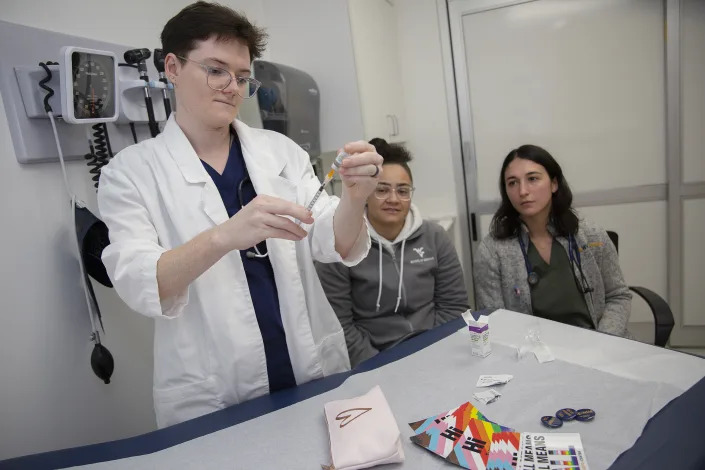

West Virginia University student El Didden holds a vial of testosterone cypionate that is used for hormone therapy on Wednesday, March 8, 2023, in Morgantown, W.Va. (AP Photo/Kathleen Batten)











